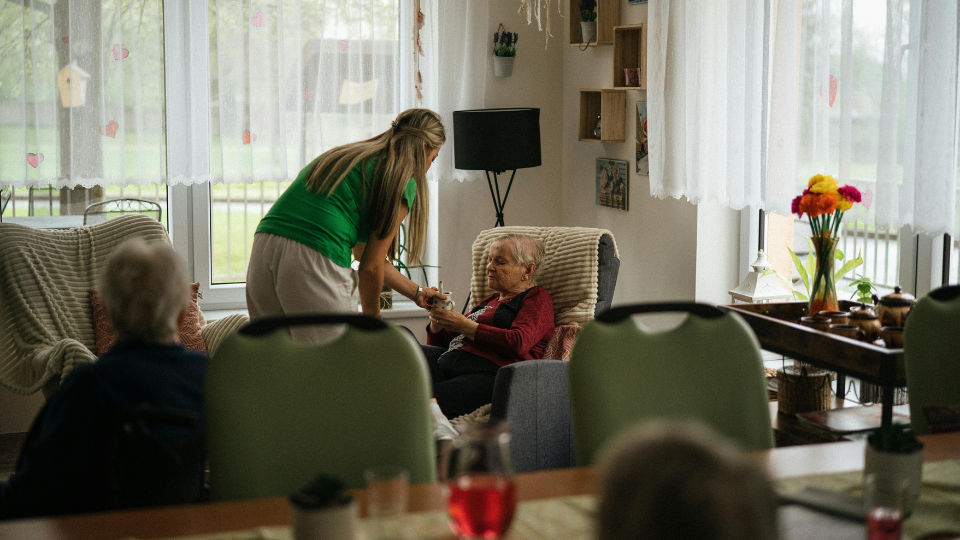Please give us feedback on one of our weekly question and answer articles. We value your time so the evaluation will only take 3 minutes or less, we promise!
Take the Survey »How Caregivers Can Support Themselves
By Emily Roundy, Health & Wellness Intern, and Ashley Yaugher, Ph.D., Health & Wellness Faculty

Caregivers are relatives or friends of individuals with chronic illnesses or disabilities who provide them with care (Centers for Disease Control and Prevention [CDC], 2021). Many Americans take on the role of caregiver with about one in three adults being a caregiver in the past, and one in five currently identifying as caregivers (AARP, 2023). Caregiving isn’t limited to adults either, with 1.3 to 1.4 million American children between 8 and 18 years old are reported as caregivers (American Psychological Association [APA], 2011).
Caregiving can be very rewarding, but it also can be very stressful and burdensome. Caregiving can induce emotional, financial, psychological, and physical strain. Caregivers give time, money, social connections, and much more to care for individuals, often neglecting their needs in the process, and putting themselves at higher risk of developing chronic conditions (AARP, 2023; CDC, 2021; Roij et al., 2019). This is why it is essential to provide support for yourself, as you act as a caregiver.
- Here are four tips to begin to support yourself as a caregiver:
- Use Coping Strategies – Distress is a common and normal emotional experience when a loved one has been diagnosed with a chronic illness (APA, 2013). Having a range of healthy coping strategies (e.g., good sleep, meditation, exercise, etc.) and knowing when to seek help to manage emotional reactions can be helpful for processing or coping (APA, 2013; Substance Abuse and Mental Health Services Administration [SAMHSA], n.d.).
- Make time for yourself – It’s easy to let caregiving take over your life and your free time, but it can be unhealthy to do so. Many caregivers find themselves faced with a lack of time and energy because of caregiving, and struggle to leave the person they are caring for (Roij et al., 2019). Work with the person you are caring for to find a balance of caregiving and personal time. Schedule it out, and make sure when the time comes, to treat it like an appointment, and make personal time a priority (Roij et al., 2019; Safe-t Home Care, 2024;).
- Reach out to others – Whether it is a trusted friend, a peer support group, or a mental health professional, talk to someone you feel safe with. It is important to work through the anxieties and stressors of being a caregiver, and to still feel connected to social relationships (Roij et al., 2019; Sullivan et al., 2015). Reach out to friends and family when you need help and allow them to support you, be clear about what you need, and set boundaries. Communicate clearly with them, explain how you want to be treated now that you are a caregiver, and how they should approach the topic of the person you are caring for with you (APA, 2013; Godstone, 2019; Roij et al., 2019; Sullivan et al., 2015).
- Utilize Available Resources – Seek out resources you or the person you are caring for can use to make your load more manageable. For example, ask your medical provider, the patient’s social worker, or your local Health Department for local caregiver support services. You could also search online databases (such as national databases like www.211.org or Utah specific ones such as dspd.utah.gov/find-a-community-resource), or reach out to other caregivers to find resources (Bruening et al., 2019; Holland et al., 2011).
Caregiving is a common and cumbersome role many Americans have. It can be rewarding to care for friends or loved ones, but it is also important to support yourself when providing care to a loved one. To support yourself as a caregiver, please remember to be kind to yourself by practicing self-care. This can look like using your coping strategies, making time for yourself, reaching out to others, or using available resources in your caregiving role.
References
AARP Research Insights on Caregiving. (2023, July 18). AARP. Retrieved May 31, 2024, from https://www.aarp.org/pri/topics/ltss/family-caregiving/aarp-research-insights-caregiving.html
American Psychological Association. (2013, August 1). Coping with a diagnosis of chronic illness. https://www.apa.org/topics/chronic-illness/coping-diagnosis
American Psychological Association. (2017, November 9). Who Are Family Caregivers. Retrieved May 31, 2024, from https://www.apa.org/pi/about/publications/caregivers/faq/statistics
Centers for Disease Control and Prevention. (2017, November 9). Caregiving for Family and Friends, a Public Issue. Retrieved May 31, 2024, from https://www.cdc.gov/aging/caregiving/caregiver-brief.htm
Centers For Disease Control and Prevention. (2017, November 9). Supporting Caregivers. Retrieved May 31, 2024, from https://www.cdc.gov/aging/publications/features/supporting-caregivers.htm
Godstone, S. (2019, Winter). How Can I Support a Friend Facing a Medical Crisis? UCSF Magazine. Retrieved May 31, 2024, from https://magazine.ucsf.edu/how-can-i-support-friend-facing-medical-crisis
Roij, J., Brom, L., Youssef-El Soud, M. et al. Social consequences of advanced cancer in patients and their informal caregivers: a qualitative study. Support Care Cancer 27, 1187–1195 (2019). https://doi.org/10.1007/s00520-018-4437-1
Safe-t Home and Care. (n.d.). Five Tips for Caregivers to Make Time for Themselves. In-Home Care | Monticello, Indiana. Retrieved May 31, 2024, from https://safethomecare.com/tips-caregivers-time-for-themselves/
Sullivan AB, Miller D. Who is Taking Care of the Caregiver? Journal of Patient Experience. 2015;2(1):7-12. doi:10.1177/237437431500200103
Substance Abuse and Mental Health Services Administration [SAMHSA] (n.d.). Coping tips for traumatic events and disasters. Retrieved February 20, 2024, from https://www.samhsa.gov/find-help/disaster-distress-helpline/coping-tips

